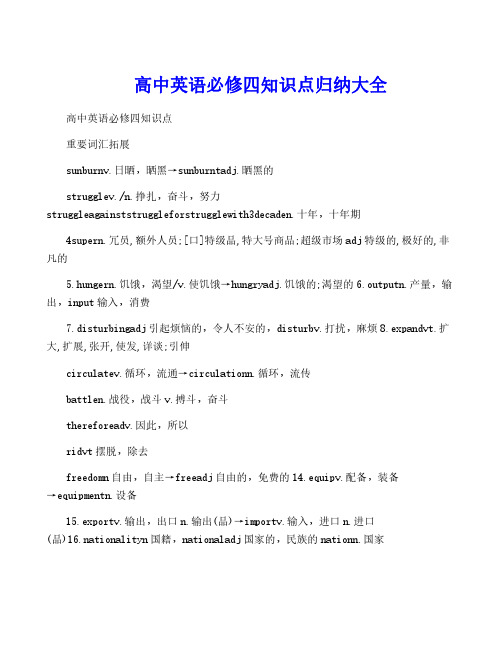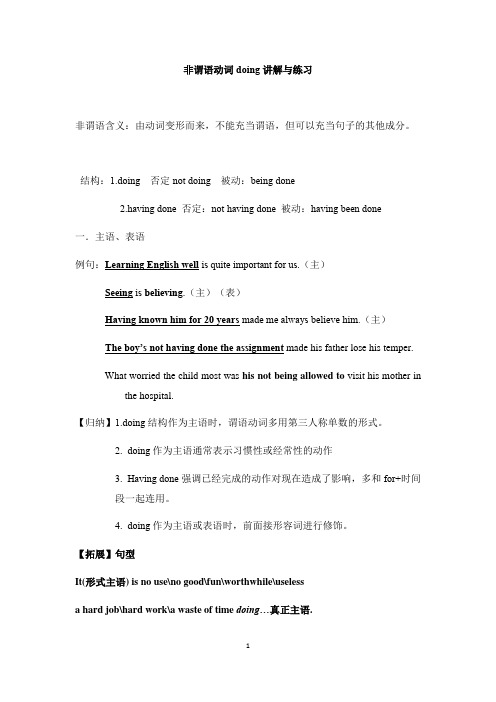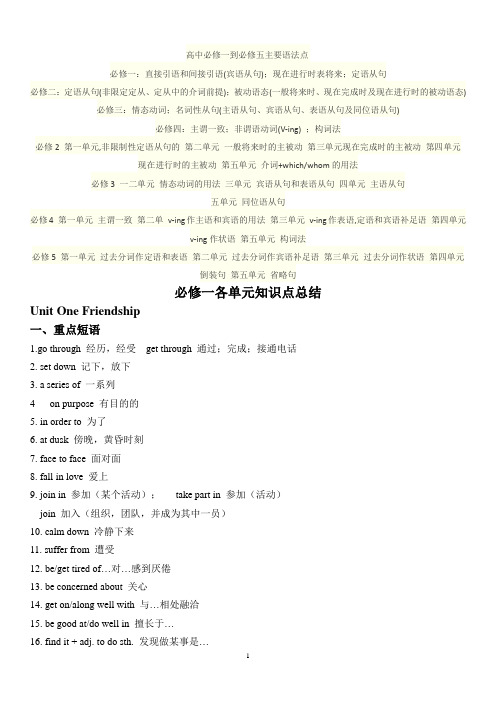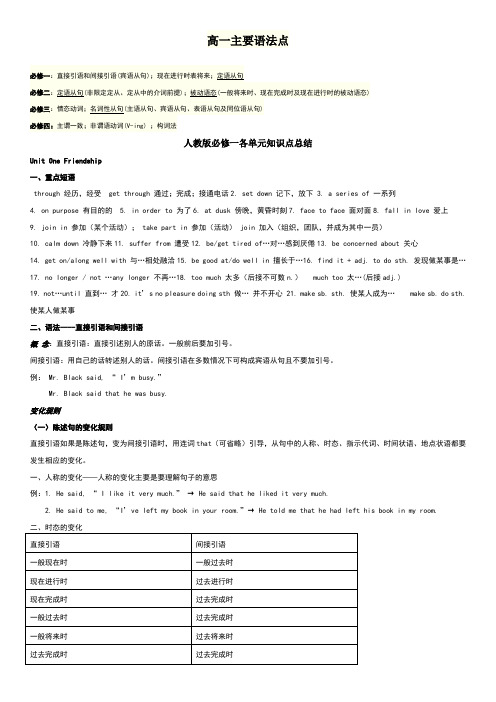必修四非谓语动词
单元讲解必修四unit4 body language

单元讲解必修四unit4 bodylanguage课本单元讲解(含课文音频):必修四Unit4 Body language_doctor今天,要和大家分享的是人教版必修四Unit4常考单词、高频短语和写作句式,并附有课文音频学起来哦!Unit4 Body language常考单词、高频短语和写作句式Ⅰ. 常考单词必背1.statementn. 陈述;说明His statement is pletely untrue.他的话完全是在撒谎。
2.greetvi.&vt. 迎接;问候I greeted her with a smile.我笑着向她致意。
(1)greet sb with... 用……迎接……;用……向某人打招呼(2)greeting n. (常用复数形式) 问候;祝贺;贺词3.representvt. 代表;象征In the western countries,V often represents victory.在西方国家,V常象征着胜利。
He represented himself as a doctor.他自称是一个医生。
[快速闪记](1)represent sth to sb 向某人说明某事,向某人传达某事represent...as... 把……描绘成……represent oneself as/to be... 自称是……(2)representative n. 代表4.curiousadj. 好奇的The children were curious to know what was happening over there.孩子们很想知道那边发生了什么事。
[快速闪记](1)be curious about 对(某事物)感到好奇be curious to do... 很想做某事;渴望做某事(2)curiously adv. 好奇地5.approachvt..&vi.接近;靠近;走近 n. 接近;方法;途径As summer approached,the weather became hotter and hotter.随着夏天的临近,天气越来越热。
高中英语必修四知识点归纳大全

高中英语必修四知识点归纳大全高中英语必修四知识点重要词汇拓展sunburnv.日晒,晒黑→sunburntadj.晒黑的strugglev./n.挣扎,奋斗,努力struggleagainststruggleforstrugglewith3decaden.十年,十年期4supern.冗员,额外人员;[口]特级品,特大号商品;超级市场adj特级的,极好的,非凡的5.hungern.饥饿,渴望/v.使饥饿→hungryadj.饥饿的;渴望的6.outputn.产量,输出,input输入,消费7.disturbingadj引起烦恼的,令人不安的,disturbv.打扰,麻烦8.expandvt.扩大,扩展,张开,使发,详谈;引伸circulatev.循环,流通→circulationn.循环,流传battlen.战役,战斗v.搏斗,奋斗thereforeadv.因此,所以ridvt摆脱,除去freedomn自由,自主→freeadj自由的,免费的14.equipv.配备,装备→equipmentn.设备15.exportv.输出,出口n.输出(品)→importv.输入,进口n.进口(品)16.nationalityn国籍,nationaladj国家的,民族的nationn.国家17.occupationn工作,职业,占领occupyv.占用,使从事,把注意力集中于...占领,占据18.confusev.使迷惑,使为难→confusedadj.感到迷惑的confusingadj.令人迷惑的19regretv./n.后悔,遗憾→regretfuladj.后悔的,遗憾的20.productionn.生产,制造,productive可生产的,可制造的,produce–v生产,制造21.discoveryn.发现,发觉,discover-v发现,focusv.集中,聚焦,n焦点,中心点reducev.减少,缩减→reductionn.减少,缩减返回目录高中英语知识点梳理重点梳理1ifnot如果不….Ifso如果这样,2.consideroneselfsth自认为是…considersbsth认为某人是…3.sincethen从那时起4.searchforawaytodosth寻找做某事的途径。
高中英语人教版必修4非谓语动词doing专题讲解与巩固练习

非谓语动词doing讲解与练习非谓语含义:由动词变形而来,不能充当谓语,但可以充当句子的其他成分。
结构:1.doing 否定not doing 被动:being done2.having done 否定:not having done 被动:having been done一.主语、表语例句:Learning English well is quite important for us.(主)Seeing is believing.(主)(表)Having known him for 20 years made me always believe him.(主)The boy’s not having done the assignment made his father lose his temper.What worried the child most was his not being allowed to visit his mother in the hospital.【归纳】1.doing结构作为主语时,谓语动词多用第三人称单数的形式。
2.doing作为主语通常表示习惯性或经常性的动作3.Having done强调已经完成的动作对现在造成了影响,多和for+时间段一起连用。
4.doing作为主语或表语时,前面接形容词进行修饰。
【拓展】句型It(形式主语) is no use\no good\fun\worthwhile\uselessa hard job\hard work\a waste of time doing…真正主语.【巩固练习】1.It's no use _______(spend)_so much money on clothes.2. I don't think it's much good __________(tell) to him.3.Your __________(fail)the exam will disappoint your parents.4.___________(expose) to sunlight for too much time will do harm to one's skin.5.The president’s __________(attend) the meeting himself gave them a great deal of encouragement.二.宾语位置:放在及物动词或介词之后(1)常见动词口诀2)need, require, want, deserve(应得)+doing=to be done.(以物作为主语)3)在excuse, forgive, pardon+形容词性物主代词+doing或者+宾格+for doing。
人教版英语必修4课后习题:Unit 4 Body Language Section 2含答案

Unit 4Section ⅡⅠ.单句语法填空1.The children were excited(excite) at the news that their parents would return from abroad.解析:考查形容词。
句意:孩子们听到他们的父母将从国外回来的消息很高兴。
excited 意思是“兴奋的”,常用来修饰人。
2.I dream of standing on the platform in the classroom and giving(give) lessons to lovely children.解析:考查非谓语动词。
句意:我梦想站在教室的讲台上,给可爱的孩子们上课。
分析句子结构可知,此处与前面的“standing on the platform in the classroom”是并列关系,所以要用giving。
3.I prefer staying at home to playing(play) with him outside.解析:考查固定短语。
句意:我宁愿待在家里而不是陪他出去玩。
prefer (doing) sth. to (doing) sth. 意为“喜欢(做)某事而不喜欢(做)某事”,为固定搭配。
4.Having eaten(eat) at the cafeteria before, Tina didn’t want to eat there again.解析:句意:由于之前在那家自助餐厅用过餐,Tina不想再去那里用餐了。
非谓语动词的动作发生在主句谓语动词之前,因此非谓语动词的完成式having eaten。
5.He got up late and hurried to his office, leaving(leave) the breakfast untouched.解析:he与leave之间为主动关系,故用现在分词形式作伴随状语。
(完整版)人教版高中英语必修语法知识点总结

高中必修一到必修五主要语法点必修一:直接引语和间接引语(宾语从句);现在进行时表将来;定语从句必修二:定语从句(非限定定从、定从中的介词前提);被动语态(一般将来时、现在完成时及现在进行时的被动语态) 必修三:情态动词;名词性从句(主语从句、宾语从句、表语从句及同位语从句)必修四:主谓一致;非谓语动词(V-ing) ;构词法必修2 第一单元,非限制性定语从句的第二单元一般将来时的主被动第三单元现在完成时的主被动第四单元现在进行时的主被动第五单元介词+which/whom的用法必修3 一二单元情态动词的用法三单元宾语从句和表语从句四单元主语从句五单元同位语从句必修4 第一单元主谓一致第二单v-ing作主语和宾语的用法第三单元v-ing作表语,定语和宾语补足语第四单元v-ing作状语第五单元构词法必修5 第一单元过去分词作定语和表语第二单元过去分词作宾语补足语第三单元过去分词作状语第四单元倒装句第五单元省略句必修一各单元知识点总结Unit One Friendship一、重点短语1.go through 经历,经受get through 通过;完成;接通电话2. set down 记下,放下3. a series of 一系列4 on purpose 有目的的5. in order to 为了6. at dusk 傍晚,黄昏时刻7. face to face 面对面8. fall in love 爱上9. join in 参加(某个活动);take part in 参加(活动)join 加入(组织,团队,并成为其中一员)10. calm down 冷静下来11. suffer from 遭受12. be/get tired of…对…感到厌倦13. be concerned about 关心14. get on/along well with 与…相处融洽15. be good at/do well in 擅长于…16. find it + adj. to do sth. 发现做某事是…17. no longer / not …any longer 不再…18. too much 太多(后接不可数n.)much too 太…(后接adj.)19. not…until 直到…才20. it’s no pleasure doing sth 做…并不开心21. make sb. sth. 使某人成为…make sb. do sth. 使某人做某事二、语法----直接引语和间接引语概念:直接引语:直接引述别人的原话。
人教版高中英语【必修四】[动词ing形式作表语-定语和宾语补足语

人教版高中英语必修四知识点梳理重点题型(常考知识点)巩固练习动词ing形式作表语,定语和宾语补足语概念引入:The music they are playing sounds so exciting .We watched three boys sharing their food with eachOur job is playing all kinds of music .`The girl singing now is a classmate of mine语法讲解【356774 ,非谓语动词之-ing形式,非谓语动词之ing形式】非谓语动词中的ing形式包括两种:一种是动名词,另外一种是现在分词。
•基本形式:》1、-ing形式作表语1) -ing形式作表语时放在系动词之后,用来泛指某种动作或行为,以说明主语的具体内容(身份、性质或情况)。
如:Her hobby is painting.她的业余爱好是画画。
My job is looking after the children.我的工作就是照顾这些孩子。
2) –ing用来表示主语所具有的特征,如:His concern for his mother is most touching."他对母亲的关爱很感人。
His words are encouraging.他的话很鼓舞人。
2、-ing形式作定语1). 说明被修饰名词的作用和用途,如:building materials= materials for building 建筑材料drinking water*= water for drinking 饮用水a reading room= a room for reading 阅览室2). 说明被修饰名词的作用和用途,如:tiring music= music that is tiring 烦人的音乐a surprising result= a result that is surprising,一个惊人的结果3). 表示被修饰名词正在进行的动作,如:正在做实验的那个学生是我们的班长。
人教版英语必修四课时作业Unit 3 Section 2

Unit 3Section ⅡⅠ.单句语法填空1.Be quiet!Do you hear someone shouting(shout) for something?解析:考查非谓语动词形式。
句意:安静!你听到有人正在喊些事情吗?根据someone 与shout的主动关系和Be quiet可判断此处表示动作正在进行,故用其-ing形式。
2.Sitting in the chair beside the window,I watched the leaves swinging(swing) in the wind.解析:考查非谓语动词形式。
句意:坐在窗户附近的椅子上,我看树叶在风中摇摆。
watch 为感官动词,后接动词作宾语补足语时用现在分词表示“正在……”。
swing“摇摆”。
此处指树叶正在风中摇摆。
3.I was greatly amazed(amaze) at how he worked out the puzzling(puzzle) problem in a creative way.解析:考查非谓语动词。
句意:他很有创意地把这个令人困惑的难题解决了,我对此惊诧不已。
be amazed at“对……感到惊异”;puzzling“令人困惑的”。
4.It is said that the new school costing(cost) 20 million yuan will soon be completed.解析:考查非谓语动词。
句意:据说这所耗资两千万元的新校即将竣工。
“sth.cost+多少钱”表示某物花费多少钱。
new school与cost之间是主动关系,因此用现在分词。
5.On hearing the disappointing(disappoint)news that their favorite team had lost the match, they all became disappointed(disappoint).解析:考查非谓语动词。
人教版高中英语必修一知识点+语法总结(全面)

高一主要语法点人教版必修一各单元知识点总结Unit One Friendship一、重点短语through 经历,经受 get through 通过;完成;接通电话2. set down 记下,放下 3. a series of 一系列4. on purpose 有目的的5. in order to 为了6. at dusk 傍晚,黄昏时刻7. face to face 面对面8. fall in love 爱上9. join in 参加(某个活动); take part in 参加(活动) join 加入(组织,团队,并成为其中一员)10. calm down 冷静下来11. suffer from 遭受12. be/get tired of…对…感到厌倦13. be concerned about 关心14. get on/along well with 与…相处融洽15. be good at/do well in 擅长于…16. find it + adj. to do sth. 发现做某事是…17. no longer / not …any longer 不再…18. too much 太多(后接不可数n.) much too 太…(后接adj.)19. not…until 直到… 才20. it’s no pleasure doing sth 做… 并不开心 21. make sb. sth. 使某人成为… make sb. do sth. 使某人做某事二、语法----直接引语和间接引语概念:直接引语:直接引述别人的原话。
一般前后要加引号。
间接引语:用自己的话转述别人的话。
间接引语在多数情况下可构成宾语从句且不要加引号。
例:Mr. Black said, “ I’m busy.”Mr. Black said that he was busy.变化规则(一)陈述句的变化规则直接引语如果是陈述句,变为间接引语时,用连词that(可省略)引导,从句中的人称、时态、指示代词、时间状语、地点状语都要发生相应的变化。
- 1、下载文档前请自行甄别文档内容的完整性,平台不提供额外的编辑、内容补充、找答案等附加服务。
- 2、"仅部分预览"的文档,不可在线预览部分如存在完整性等问题,可反馈申请退款(可完整预览的文档不适用该条件!)。
- 3、如文档侵犯您的权益,请联系客服反馈,我们会尽快为您处理(人工客服工作时间:9:00-18:30)。
非谓语动词包括:___________________________________指出下列句中不定式所充当的句子成分,并做归纳总结。
1. He seemed to be sleeping . ( 表语)2. There are all kinds of difficulties to be overcome. ( 定语)3. I’d like to make a suggestion. ( 宾语)4. It is of great benefit for all of us to do morning exercises every day. ( 主语)5. He feels it a duty to help the disabled in the community. ( 宾语)6. I want this letter to be opened now. ( 宾补)7. Mary often goes back to her hometown to visit her grandparents. ( 目的状语)8. I often hear her sing in English. ( 宾补)1. 动词不定式属于非谓语动词,在句子中可以充当除谓语外的其他各个句子成分;3. 在should like, would like, expect, want, refuse, decide, pretend, promise, decide, offer等后不能用动名词作宾语,只能用不定式作宾语。
4. 在make, let, have等使役动词或者hear, see, watch等感观动词后作宾补的不定式常省略to ;但在这些词的被动式后作主补时,要加上to .如例8,把例8改成被动式:She is often heard to sing in English.5. 如果动词不定式的逻辑主语为这个不定式所表示的动作的承受者时,不定式一般就用被动语态形式。
但在easy, difficult等少数形容词后的不定式,习惯上用主动形式表示被动意义。
I hurried to the station only to be told (tell) that the train had left five minutes before.With a lot of difficult problem to settle (settle), the newly-elected president is having a hardtime.6. 不定式做定语时的几种用法:(1)表将来。
It’s hoped that the 16th Asian Games to be held in Guangzhou (将在广州举行)will be a great success.(2)序数词或最高级等后常用不定式作定语。
She was the first woman to win the Nobel Prize. (赢得洛贝尔奖)Mary is the best person to do the job. (做这个工作)(3)常用来修饰chance, idea, ability, way, reason, time, fact, key, ambition等抽象名词。
Last year I had a good chance to go abroad for further study. (到国外深造)(4)动词不定式做主语和宾语时通常放在句子的后面,用it作形式主语或形式宾语。
(如例4和例5)It is of great importance to respect each other (彼此尊敬).We find it impossible for work to be finished (完成) ahead of time.翻译句子:1. My parents have always made me feel (感觉) good about myself, even when I was twelve.2. With a lot of difficult problem to settle (许多问题要解决), the newly-elected president is having a hard time.3. To complete the project (完成这个工程) as planned, we’ll have to work two more hours a day.4. The parents hurried to the whole street to look for the lost child. (去寻找那个丢失的孩子)5. He pretended to be reading (假装正在读书) when the parents came into his bedroom.1. Learning is important to modern life. ( 主语)2. The problem is quite puzzling. ( 表语)3. I suggest doing it in a different way. ( 宾语)4. The TV set needs repairing. ( 宾语)5. I heard of his having been chosen to be the coach of the team. ( 宾语)6. The question being discussed is very important. ( 定语)7. They went out of the classroom, talking and laughing. ( 伴随状语)8. Having been shown around the lab, we were taken to see the school library. (时间状语)9. I felt my heart beating violently. ( 宾补)10. His not coming made everyone present very disappointed. ( 主语)11. Not having studied his lessons very hard, he failed the examinations. ( 原因状语)动词的-ing形式有以下特征:1. 具有动词的特征,有时态和语态的变化,并可带状语、宾语等。
当分词与其逻辑主语有动宾关系时,用被动语态。
2. 具有一般式(doing)和完成式(having done)之分,一般说来,一般式的动词与谓语动词同时发生,完成式表示其动作发生在谓语之前。
还有一般被动式(being done)和完成被动式(having been done)之别。
3. 动词的-ing形式具有动词的特征,同时又具有名词、形容词和副词的特征,因此,它可以在句中作主语、表语、定语、宾语、宾语补足语和状语。
4. 否定形式:not+动词的-ing形式5. 在suggest, keep, allow, finish, enjoy, mind, practice, avoid, admit, advise, consider, imagine, appreciate, escape等后不能用不定式作宾语;在forget, remember, regret, mean, try等动词后既可接动名词,也可接不定式,但意义差别较大。
如:I forgot seeing her.我忘记见过她。
(以前见过)I forgot to post the letter.我忘记寄信了。
(信没寄)Knowledge is power. 知识就是力量。
remember to do sth. 记得要去做某事remember doing sth. 记得做过了某事regret to do sth. 对要做的事遗憾... regret doing sth. 对做过的事遗憾、后悔mean to do sth. 打算、想mean doing sth. 意味着try to do sth. 设法去做某事try doing sth. 试一试做某事6. 在表示“需要”的need, want和require等后用-ing形式的主动形式表示被动意义,也可用不定式的被动式。
The computer needs repairing/ needs to be repaired . (需要修理)句型转换1. Walking in the street, I saw him.When/While/As (I was) walking in the street, I saw him.2. Working hard, you will succeed.(1)If/As long as/So long as you work hard, you will succeed.(2)Work hard , and you will succeed.3. Being ill, she stayed at home.(1)As she was ill , she stayed at home.(2)She stayed at home because she was ill.(3)She stayed at homebecause of/due to her illness.(4)Illness forced her to stay at home.4. Having failed m any times, he didn’t lose heart.(1)Although (he had) failed many times, he didn’t lose heart.(2)Although beaten/defeated by failure many times,he didn’t lose heart.5. His rich parents died, leaving him a lot of money.His rich parents died and left him a lot of money.6. He is standing there, singing.He is standing there and singing.翻译填空:1. 他冲进正在燃烧着的房子。
He rushed into the burning house .2. 站在那儿的那个女孩是我的同班同学。
